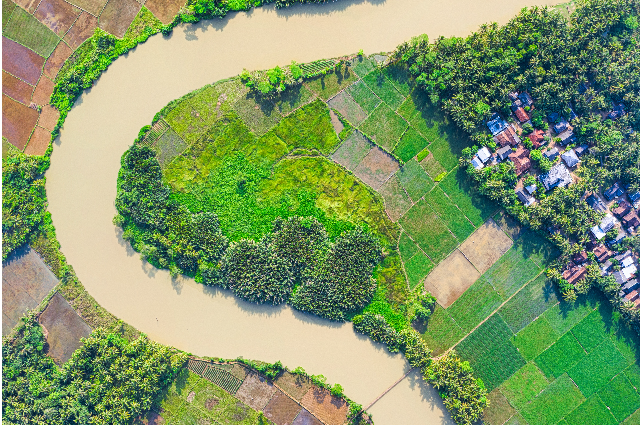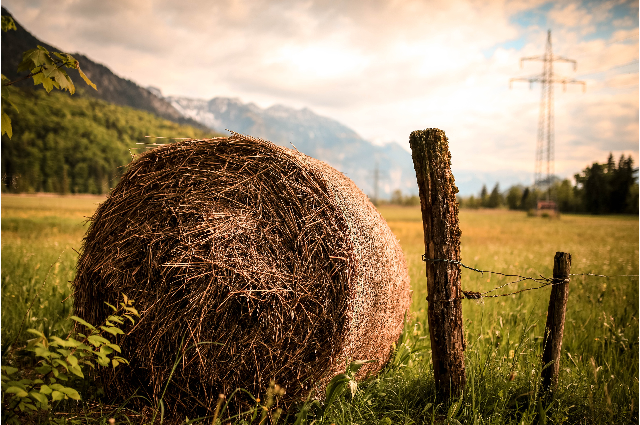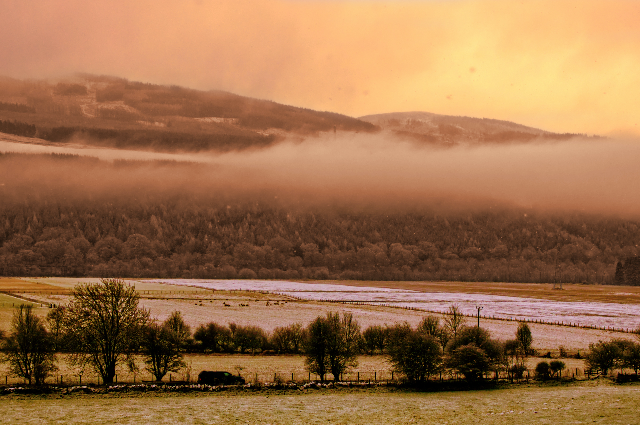
“I want to be an artist,” I inform my father glibly, disrupting his morning prayer that ceases abruptly as he visibly stiffens.
“Leave those things to the wealthy-mainstream. We are farmers. Is it asking too much that I should live to see my lineage continue the tradition of feeding my countrymen?” he rejoinders, eyes opening promptly into gimlets.
“Waiting for your early demise it is then,” I mutter under my breath.
“What was that?” The man has sharp hearing for his age.
“I said, no way to convince you otherwise, then?”
He scowls but doesn’t bother to answer before he leaves to go find mother in the kitchen, without resuming his prayers, reverence apparently surrendered to aggravation. At least he didn’t outright deny my plea. A flower of hope blossoms in my heart and wilts almost instantly. This wasn’t the first time I had articulated my wishes in life and it wasn’t the first time he had refused to give me his blessing either. The sting of rejection is still fresh when my mother emerges from the kitchen offering me her warm smile, a balm to my wound. All my wounds.
“Give him time,” she says, laying her fingers flat on my shoulder. Who knows what’s on my face?
I only nod, unable to form a coherent sentence on account of the loving gesture. She has always been this way, my mother. It barely takes her a look to know what goes on inside.
“Oh, get over yourself already! Breakfast is waiting for you in the kitchen. I made your favourite too! Now, now, big boy.” She gives my back a few gentle nudges.
“No way I’m sitting next to Hitler!”
“Adarsh!” she gasps in feigned horror then chuckles shaking her head.
“I’ll be alright, ama.” She is aware that it is not delay-in-breakfast that I’m talking about; her smile doesn’t meet her eyes anymore.
“You know, your father has been in existence for six-decades now and I’ve known him for the better part of it. He might not be so tractable but he isn’t made of stone either. He’ll come around. Sooner or later,” she approaches the door to see if it would rain today.
“I can only hope you’re right,” I mirror her smile.
. . .
“Oi, Chhetri! Get your lazy feet here!” Sabir bellows from our favoured tea-stall across the road. Busted. I’d been meaning to keep away from him for a few days but the universe won’t have it. I put up a saccharine smile jogging to him.
“Now, I’d like to be nice to you, boy, considering my ama is praying for it in the temple this very moment, but you’re making it real tough. So, tell me, where is my money?” He speaks the last line so low that only I can hear as his fingers curl around the back of my neck making the hair there stand on end.
I crane it to look up at his raven eyes that loom at least a few feet above mine and try to keep my smile intact although I can practically hear it wobble. “It hasn’t rained in weeks. Harvesting season is in but credit will only flow once the crop absorbs the last of the winter showers to ensure highest quality. You know how shrewd the brokers can be,” I offer, well aware that he hasn’t the slightest idea about agro-economy.
He grunts, refusing to admit that he wouldn’t know even if it was otherwise. Nothing is as irking to the pride as intellectual inferiority to the intellectually superior after all. “Four days.”
“But– ”
“Four more days before your dear father hears about the colours you hide under your bed only to find the safe under his own drained.” Sabir leaves no room for negotiation.
. . .
I drag myself home, head hung low from the sempiternal role-conflict of early adult life. Sabir is my dealer. Not the kind who abets hormonal teenagers into substance-abuse. No, Sabir is a walking-breathing Suez Canal. He has contacts amounting up to such atrocious figures for one person, half of this side of the Terai cruises through his sea oblivious. It is on account of those contacts that Sabir secures the finest paints coming in from the West for me at more economical rates, and I pay him just as handsomely. Except at twenty-whole-years of age, I remain unemployed. Naturally, my modus operandi for the arrangement of said handsome wherewithal might be a tad morally questioning. Just a tad, though.
I could easily jump into the family-business, which is, above all, what my father desires. But I’d rather galivant my way through Kailali than invest myself into anything momentary because I will, come hell or high water, one day become an artist. Besides, the Chhetri way calls for never being perfunctory in one’s work. Or maybe I enjoy spiting my father too much. I, however, do pitch-in during the harvest season because my father and both my siblings combined aren’t enough with what the bloodhounds merchants essentially become at this time of the year. But mostly anything that would spare my mother the labour. She had enough on her plate be as it may. And in the course of this disguised-employment, I hoard the healthiest, highest-yielding stalks of wheat I can get my hands on to sell them at hiked-rates on the sly. Gee, art equipment is expensive. I could be doing drugs. At least that is what I feed my superego.

Network, though, isn’t the only thing that makes Sabir Rana infamous. Apart from six-feet and two inches of pure muscles, tendons and bones which has made him somewhat of a local sensation given that Nepal contributes more significant numbers to the population of the shortest people on Earth than anything, Sabir is known for his average Nepali woman for a temper: short, and time taken to resort to violent measures that is, you guessed it, also short. All things considered, Sabir has always looked out for me: from disgraceful matriculation results to the sorrow of woman repulsive traits, but particularly, he saw me for the progressive-nonconformist twat I was and never resented me for it. Instead, he chose to indulge my mischiefs for they became my only source of joy amidst the pitiful suffocation of being gaslighted into believing I wasn’t worth anyone’s time because I was different. Everyday. Only Sabir didn’t pity me.
“There are two distinct worlds, Adarsh,” he once told me sipping his tea as we sat in the smooth wooden-benches of the meticulous tea stall. His voice turning grave as the playful light of our gig from a second ago left his eyes, he had continued, “one, of the family, caught in the cycle of poverty, burdened by the stigma of ascribed-caste; the other a vicious society of sycophants who derive thrill from the humiliation, subordination and exclusion of others. Together, they have imposed a baggage on you that you cannot put down. Before you are aware, you accept it naturally as did your father. To do anything else would mean to dare and daring is not part of our upbringing.”
“You probably get this a lot but philosophical Sabir is my least favourite,” I’d retorted, pleased with myself. It’s not every day you get a one-up on Sabir Rana .
“You dare.”
“You bet your brilliant billboard-of-a-chest I do,” I’d done it again. And perhaps I’d let this novelty of successfully outsmarting him more than once get to me because I thought I heard him add something like, “And that gives me hope.”
. . .
A hopeless romantic of the twenty-first century would swear on a stack of rom-com Blu-ray disks that here are only three, but I say there are five because I am fairly certain I heard him right when my father nearly spat, “decadent brat of a son” to someone as I made to step in from the back-door and the words pierced my heart. Much like cupid’s arrow minus the affection thus induced.
“Perhaps this marriage will finally make him settle down, help him see what is right for him which is of course, a life of security and prestige that our common occupation offers rather than that of a vagabond he seems so eager to embrace.” His monologue is followed by some aggressive head-shaking of compensatory modesty by what I could tell from the shadows of possible guests whom I couldn’t see from my point of reconnaissance.
I remain still, listening to my own character-analysis-slash-marriage-proposal until I hear shuffling of feet and goodnight wishes.
“I refuse to stand by you, Paresh. I won’t let you do this to my son, he’s had enou– ”
“Our son,” my father cuts her off.
“Really? Since when?” I finish for her. “I can’t remember the last time you’d been a father to me. Why, do you?” He whirls around, eyes wide to find me there. Ama's palm presses around her mouth.
“And just who are you to remind me of my fatherly duties? Go to bed, its late,” he hisses, clearly pained to be sharing the same air as me.
“Baba, please listen to me. I want to be an artist. I want to paint the world in my colours, make it immortal with the tip of my brush. And I understand that it takes time to be recognised in this line, that the journey to security and prestige is a long one. But, baba. I’ll be happy. I won’t look back at my life and have ‘what-if’ crises when I’m your age. Marrying me off to another farmer’s daughter would be unfair to the both of us. It would make things worse much less solve anything” I put my heart in a plate and hold it up to him.
“I’m only doing what is right for you, just like my father did for me,” he hurls the plate out the damn window.
“Well, I’m sorry if grandpa Ravana was harsh to you, but you have no right to take it out on me.”
“Why does he speak like this? Does he think he’s being funny?” He turns to my mother for help. He gets none.
“I’d do you a favour, father and say yes,” my eldest brother materialises from somewhere to my right as baba’s eyes widen, jaw slacking.
“Wh…what’s that?”
“That is you.”
It takes me a moment to register what could cause a reaction as such but I am too late. I almost trip myself and fall on my behind turning around to see Aryan clutching a canvas to his chest: a portrait of my father, lips eternally curled, eyebrows eternally pinched, chin eternally high, and nose eternally sharp with a greying curl hanging lose on his forehead. I know all these details because I painted it.
“So is this,” says Akhil, my elder brother, gripping another similar portrait to my left, also of my father, except in this one, his arms are crossed above his chest. Eternally.
“And this,” I nearly jolt at the sight of ama bearing another with a very passable imitation of my father’s legendary gimlet-eyed glower. Sweet sneaky woman.
Baba doesn’t speak for a long time. How wonderful. We’ve finally rendered him speechless.
“More like you have, little brother, with your marvellous paintings,” Aryan replies and I wince. I’d said that out loud.

We’re under the banyan tree in our farm with the sun sinking behind the majestic expanse of the Terai casting a heavenly honey-and-blonde glow to the sky. We all have a glass of fresh mango-juice in our hands and are smiling at one another before we burst out laughing at the same time. It’s been fifteen-years and I still refuse to get used to the sight of my father smiling. Rare as it is, I’ve tried to paint it countless times but can never quite manage to get it right.
“I’ll go help ama and our two sisters-in-law with lunch,” my wife says from where she is tucked under my arm. Thank the lord my father had asked her parents for her hand in marriage that day. I nod and kiss her hair, my hand automatically reaching for her swollen belly. She smiles up at me and I’m left hoping all my unborn children inherit it. And then there were four.
“Never thought I’d live to see Adarsh become a father,” Aryan quips and I roll my eyes.
“Better late than sorry,” Akhil returns. Baba’s lips twitch eerily. If a human could grin without moving a muscle, he just did it.
I know now what Sabir meant all those years ago. He’d laid out my truth before me. I’d just been too smug to see it.
There is a sudden outcry of shrieking voices and footballs are flung up in the air demanding immediate adult participation before our father and my brothers join-in on the frenzy of my nephews against the undulating green of our field. I chuckle. This landscape is definitely going above the hearth.
